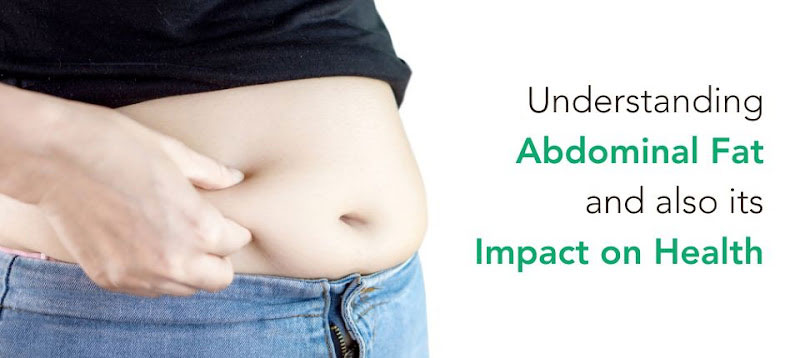
Understanding Abdominal Fat & Its Impact on Health
Does Abdominal Fat Cause Major Health Risks?
Almost everyone has abdominal fat and few do anything to solve it!
In the days when OTT had not taken over the world, there was a series of advertisements by a famous green tea brand focusing on belly fat. While the premise was problematic, we cannot ignore the hidden danger of abdominal fat being showcased through the visuals.
So, what is Abdominal Fat or Abdominal Obesity?

According to the National Library of Medicine, it is defined as an excess deposit of fats in the abdominal region and is a common health condition seen in South Asians. Let's break this down to understand it better!
- Abdominal fat is also known as visceral fat or Abdominal Obesity
- It's the kind of fat that is saturated deep within the abdominal cavity
- It surrounds vital organs like the liver, pancreas, and intestines.
- It poses a greater risk to health due to its proximity to internal organs.
- The waist circumference ratio is 102 cm for men, 88 cm for women.
- The waist-to-hip ratio is 0.95 for men, 0.88 for women
If you feel you may have excess abdominal fat, we're here to create a personalized diet plan for you!

So, what factors increase the risk of Abdominal Obesity?
Many intermingling challenges are creating this vicious cycle however we will attempt to break it down into several easy-to-understand factors:
-Sugary foods and beverages- Foods high in added sugars such as flavored yogurts, cereals, granolas, pre-packaged, sweetened beverages, and other processed foods are high in calories and sugar, with no nutritional value.
-Alcohol- Alcohol, red wine in particular is high in calories and sugar, increases appetite, decreases fat oxidation, and increases cortisol leading to higher chances of abdominal fat storage.
-Trans fats- Often found in baked products and packaged foods cause a redistribution of fat tissue into the abdomen. Trans fat is formed when food manufacturers turn liquid oils into solid fats like shortening and hard margarine by adding hydrogen.
-Sedentary lifestyle- Activities such as sitting or lying down constantly increase the abdominal fat deposits that can be burned off with a daily dose of 30 minutes of exercise every day.
There are also other factors such as low protein diets, menopause, the wrong gut bacteria, stress levels, low fiber diets, genetics, lack of sleep, smoking, and many more which further complicate the situation.
If you feel you're dealing with any of these challenges due to excessive Abdominal Obesity, we're here to create a personalized diet plan for you!

Now, that we know what causes it, let's take a look at the health risks associated with abdominal fat or abdominal obesity:
-Asthma: Abdominal Obesity causes systemic inflammation, a key factor in asthma development as the adipose tissue around the abdomen releases pro-inflammatory cytokines such as TNF-alpha and IL-6, exacerbating airway inflammation. This excess abdominal fat alters respiratory mechanics, leading to decreased lung function and increased airway hyperresponsiveness, that are both triggers of asthma.
-Cancer: Abdominal obesity is associated with insulin resistance and hyperinsulinemia, which can stimulate cell proliferation and inhibit apoptosis, promoting tumor growth and progression. Adipose tissue secretes hormones such as leptin and estrogen, which can promote cell proliferation and angiogenesis, contributing to the development of hormone-related cancers like breast and endometrial cancer
Dementia: Excess abdominal fat is linked to insulin resistance and dysregulation of glucose metabolism, which are key factors in the development of dementia. It is also linked to chronic low-grade inflammation, increased production of inflammatory cytokines, and releases of adipokines such as leptin and adiponectin, that regulate neuronal function and synaptic plasticity. Dysregulation due to abdominal obesity may contribute to neuronal dysfunction and the onset of dementia.
Hypertension- Excess abdominal fat increases the secretion of pro-inflammatory cytokines, leading to endothelial dysfunction and arterial stiffness, key drivers of hypertension. It also leads to insulin resistance and hyperinsulinemia, which promote sodium retention and sympathetic nervous system activation raising blood pressure.
Diabetes- Excess abdominal fat triggers insulin resistance and impairs glucose metabolism. it increases the levels of free fatty acids, which interfere with insulin signaling and promote gluconeogenesis, contributing to hyperglycemia and insulin resistance. It also disrupts insulin sensitivity and pancreatic beta-cell function, increasing the risk of type 2 diabetes.
Hypercholesterolemia- Adipose tissue is metabolically active and releases pro-inflammatory cytokines and adipokines, which promote hepatic cholesterol synthesis and inhibit LDL receptor activity. Excess abdominal fat causes elevated levels of total cholesterol, LDL cholesterol, and triglycerides, contributing to hypercholesterolemia.
Cardiovascular disease- Excess abdominal fat promotes atherogenic dyslipidemia, insulin resistance, and systemic inflammation. It is also closely linked to metabolic syndrome, hypertension, and dyslipidemia. Adipose tissue secretes inflammatory cytokines and adipokines, contributing to endothelial dysfunction, arterial stiffness, and plaque formation all key factors in cardiovascular diseases.
There are also other dangers such as Joint and Lower Back Pains, Hyperuricemia, Obstructive Sleep Apnea Syndrome, Stroke, and many more!
If you feel you're dealing with any of these challenges due to excessive Abdominal Obesity, we're here to create a personalized diet plan for you!

So, what can one do to solve this?
-Increasing fiber intake- Particularly soluble fiber found in foods like oats, legumes, and fruits, not only aids in weight loss by promoting satiety but also plays a crucial role in reducing abdominal fat. Incorporating these fiber-rich foods into your daily meals can help regulate digestion, improve metabolic function, and contribute to a healthier weight management journey.
-Balanced Diet- Choosing foods such as fruits, vegetables, whole grains, and lean proteins and reducing intake of processed foods and added sugars can effectively reduce abdominal fat. By prioritizing nutrient-dense foods and minimizing processed options and added sugars, you're not only supporting your efforts to trim abdominal fat but also nurturing your body with essential vitamins, minerals, and antioxidants for optimal health.
-Limiting alcohol consumption- Reducing or limiting alcohol consumption can reduce abdominal obesity and visceral fat accumulation. By moderating alcohol consumption, you're not only lowering your risk of weight gain but also supporting better liver function and metabolic health.
-Consuming protein-rich foods- Increasing satiety, preserving lean muscle mass, boosting metabolic rate, and supporting overall fat loss, protein-rich foods like lean meats, fish, tofu, and legumes can be valuable in the reduction of Abdominal Obesity.
-Incorporating healthy fats- Such as those found in avocados, nuts, and olive oil, into the diet can promote feelings of satiety, enhancing fat metabolism, and providing essential fatty acids, these nutritious fats play a vital role in supporting overall health and achieving a more balanced body composition.
-Ensuring adequate sleep- Short sleep duration and poor sleep quality are associated with higher levels of visceral adiposity and increased risk of obesity-related metabolic disorders. By aiming for 7-9 hours of restorative sleep each night, you're not only supporting optimal hormonal balance and metabolic function but also minimizing stress-induced cravings and promoting overall well-being.
-Stress management- Mindfulness meditation and yoga can help lower cortisol levels and mitigate stress-induced overeating thereby reducing abdominal fat. By lowering cortisol levels, mitigating stress-induced overeating, and promoting a sense of calm and balance, these mind-body practices can be powerful tools in your arsenal against abdominal fat.
-Portion control- A caloric deficit through portion control and mindful eating is crucial for reducing abdominal fat. By tuning into your body's hunger and fullness cues, savoring each bite, and practicing moderation, you can enjoy a satisfying and nourishing diet while effectively managing abdominal fat.
-Consistency and long-term adherence- Pay attention to the importance of gradual, sustainable changes in diet and exercise habits for achieving and maintaining healthy body composition and abdominal fat levels over time
Regular physical activity- Including aerobic exercises and strength training plays a crucial role in reducing abdominal fat and promoting a healthier lifestyle. Remember, it's not just about quick fixes—it's about making lifestyle choices that support your long-term health and well-being.
For more such tips, we're here to create a personalized diet plan for you!
Conclusion-
Abdominal obesity is a major challenge in many countries today, especially in India. However, it is not the end of the journey. Help is around the corner in the form of dieticians who specialize in dealing with these exact challenges.
Take your health into your own hands. Take control by adopting lifestyle changes that target abdominal fat and reduce your risk of chronic disease. Consult a healthcare professional or registered dietitian for personalized guidance and support on your journey to better health.
Remember, we're here for you!